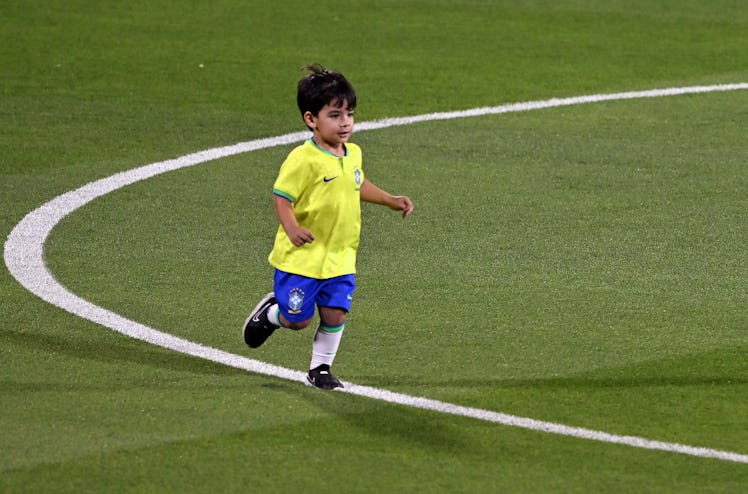American Kids Stink At Soccer Because of Baseball
Ian Campbell wants to put the fun in fundamentals.

Ian Campbell isn’t from the U.S., but the Irish transplant and father of two daughters has a plan that might help America fix youth soccer. It’s not exactly a secret that this country struggles to produce world-caliber talent — even if the young USMNT did make it to the World Cup this year. Considering America’s wealth, population, and massive success in the development of youth talent in every other sport, coaches everywhere are looking for ways to shore up the leaks. Campbell’s solution? First, America has to stop pretending soccer is like any other sport.
Long before Campbell became a passionate soccer dad to his 4- and 9-year-old daughters, he was a young boy in Dublin with dreams of playing soccer on a professional level. He played at the semi-pro level but hit a ceiling. Then he came to America and found himself comparing his experience with stateside friends. He found that from as early as age three, kids in the U.S. are poorly educated. Coaches tell kids to play long before they understand the game. The result? Barely controlled chaos and inadequate skill work.
Why do Americans do this? Because it works fairly well for basketball and baseball.
When Campbell’s oldest daughter was 8, she tried out for a softball team despite never having held a bat before. Campbell expected it would be a while before she would end up the field but found the opposite to be true. “Within five minutes of her first softball practice, she was on the field playing,” Campbell recalled. Campbell was shocked — doubly so after it worked.
“A baseball or football game can be surprisingly organized even if the kids are young because of the clarity of positions,” Campbell explains. But young kids asked to play soccer just chase the ball around unless they are taught strategy and given meaningful instruction on positioning. Successful young soccer players in America tend to be great pure athletes or just the fastest kids around because of the lack of emphasis on ball handling. That’s not true in Europe. “If you can’t control a ball, how can you possibly be expected to play a game?” Campbell asks. The answer, of course, is that you can be expected to play a different sort of game — you just can’t be expected to play it well.
“Probably the biggest problem with youth soccer in America is that coaches are not qualified to be teaching kids the mechanics of the game,” Campbell says. It’s not an uncommon complaint but Campbell explains that does not make it any less of an issue. Most youth soccer coaches are parents who have little or no soccer experience of their own, so naturally, they have little idea on how to teach kids how to play a deceptively complex sport. Campbell knows a change this large can seem intimidating but he points to Iceland and Germany as examples of countries that returned to fundamentals and are now seeing success on a global level.
“Both of these countries developed five-year plans or ten-year plans to revamp their youth soccer programs in ways that focused on coaching and fundamentals,” Campbell points out. “Germany is the reigning World Cup Champion and Iceland is far more competitive than it should be given its small population.”
To truly bring soccer to the level of success found in the NBA or NFL, the U.S. must be willing to train coaches who understand the ins and outs of the games.
But even if the coaching were to be addressed, how does America convince kids to stick with soccer in the first place? Unlike other sports, soccer can’t be fully learned by playing, which means that kids may still be tempted by other sports that promise more immediate results. Campbell is hawking a solution he calls Dribblers Football Club, which he describes as a “fun, easy to use, and mobile-based program for parents to teach three-to-five-year-olds basic soccer skills from home.” The basic notion is to make it so that kids who master skills feel like they’re winning. Also, the program is a trojan horse.
“I found that the idea of a kid quitting because they ‘failed’ does not exist in video games or mobile games,” Campbell says. “If kids lose, they don’t see it as a reason to quit. They want to play again and improve on their last attempt. I wanted to bring this attitude to soccer.”
Campbell found that by combining technology with the basic drills, he can bait kids into practice using incentive. Each “level” or drill that a kid successfully completes comes with the reward of a new comic book, adding an easy incentive that provides concrete motivation for kids to focus and develop their skills. Each of the games, such as classics like “Zig Zag Zebra,” are easy to do from home and may even help the parents start to understand soccer as well, which better sets them up for coaching. Obviously, this is not as good a solution as a culture of skill building, but it’s a way to kickstart an Icelandic-style soccer revolution.
If American kids are going to continue to play soccer, they might as well get good at it. That’s not going to happen without a return to basics. That’s not gonna happen if parents keeping taking the baseball approach to soccer, which rewards good athletes quickly but doesn’t elevate the standard of play.
This article was originally published on